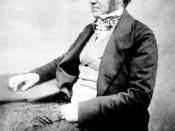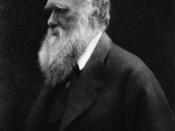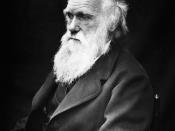Evolution; it's a common term in today's world. There are no discrepancies as to whether or not man was created or has evolved. It is known, and it is the fundamental basis of mankind's history that man has evolved just as every other living thing on this earth. However, the idea of evolution has not always held its ranks as being one of the "greatest" theories of all time. In fact, at the time of its release in 1859, Charles Darwin's theory of evolution had gained a negative reception from the people of the era. The religious populations of the world were outraged, scientists were displeased with this farfetched grasp of science, and a cult following of Darwinists was created. Not to mention the fact that the general population was in outraged at the thought of a monkey as an ancestor of the greatest and most notorious creation of god; the ever powerful man.
In order to fully understand why his theory caused such uproar, we must first examine the content of Darwin's original theory. In the introduction of Origin of the Species, Darwin states that:
"As many more individuals of each species are born that can possibly survive, and as, consequently, there is a frequently recurring struggle for existence, it follows that any being, if it vary however slightly in any manner profitable to itself, under the compiles and sometimes varying conditions of life, will have a better chance of surviving, and thus be naturally selected. From the strong principle of inheritance, any selected variety will tend to propagate its new and modified form."�
Darwin believed that members of a species have the ability to adapt to changes in their environment. Those species that do adapt will have a tendency to outlive those members of the same...



Very helpful
liked the way they had foot notes included, very helpful with the information they provided
5 out of 5 people found this comment useful.